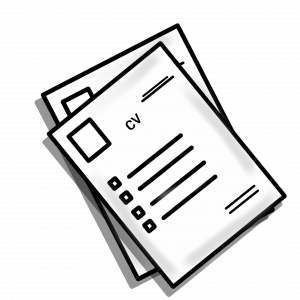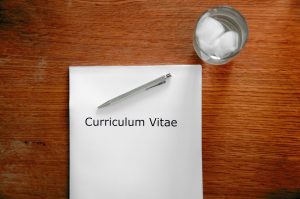
Job seeker on LinkedIn
A headhunter uses LinkedIn to find candidates who fit into the client’s team. In order for a headhunter to find the right candidates, they look
Your CV is the tool that helps you get your foot in the door when looking for a job. Therefore, it is important to put effort into creating a thorough CV that is adapted to the job you are applying for. We have made a review the various aspects of a CV, which you can use when writing your CV.
A CV, which stands for curriculum vitae, is a document used when applying for a job. It allows you to summarize your education, skills, and experience so that you can sell your skills to potential employers. Your CV must be so thorough that the recipient can read up to your qualifications.
Not everyone in all recruitment processes requires the applicant to submit an application, and therefore your CV must be able to stand alone. In the application processes where an application must be sent, the recipient will most often start by looking through your CV. If the recipient cannot see that you have the required qualifications, you will quickly end up in the pile where the application is not read. Studies have been carried out that show that the recipient spends 15 seconds reading through a CV. Unfortunately, it does not correspond to the time you have spent on the CV, but it explains why it is important that you spend time creating a clear CV that is easy to read.
A standard CV should be no longer than two A4 pages, which we have written more about here. That being said, there are no one-size fits. For example, a recent graduate or a graduate with minimal experience may only need to use one A4 page.
Although not used as often, a three-page resume may be necessary for people in high-level positions or for people who have gained a lot of experience or have held several jobs over the past five to ten years.
The most difficult art is finding the balance between keeping your resume concise, but you should also avoid neglecting your experience.
To save space, include only the main points of your education and experience. Stick to relevant information and avoid repetition.
Having trouble editing your resume, ask yourself if this information sells you. If it doesn’t, cut it out. If it is not relevant to the job you are applying for, you must delete it. If they are old details from ten years ago, you must summarize them instead.
State your full name, your mobile number, and your email address so that the recipients have the opportunity to contact you in the way the recipient wants. Do not put personal information on your CV, and never your CPR number!
At the beginning of your CV, you create a profile description, which is a concise summary that highlights your most important qualities and helps you stand out from the crowd. It is usually placed at the beginning of a resume to highlight a few relevant achievements and skills while expressing your career goals.
A good profile text focuses on the sector you are applying for, as your eventual application will be job-specific.
Your profile text must be short and precise, and make the reader curious about the rest of your CV. The text should therefore not begin with “My name is Lars Sørensen, and I am 37 years old”. It is better to get straight to the point with a description of one of your qualifications preferably spiced with an achieved goal that makes it interesting to read more.
You may brag, but never be dishonest. It can be difficult for some to brag, and it may therefore be an idea to start by reading the job description and noticing which skills are highlighted. Then find the keywords that are specific to exactly this job posting. You must then formulate the job description in 3-4 sentences. Once you have this, you can create your profile text, which has as many similarities as possible with your own formulated job description.
List your work experience in reverse order of date, making sure everything you list is relevant to the job you’re applying for.
Enter your job title, the name of the company, how long you have been employed in the organization, and the most important areas of responsibility
If you have lots of relevant work experience, this section should come before education.
State all previous educations with dates, including professional qualifications. Put the most recent first. Mention specific modules only if relevant. If you are a recent graduate, this section must come before work experience. If during your education you have done an internship or collaborated with companies on a task where you have gained experience that can be used in the job you are applying for, make sure to write it down. The recipient only knows what you choose to write.
This is where you talk about the foreign languages you speak and the IT packages you can use competently. The key skills you list must be relevant to the job.
You must not exaggerate your abilities, as you must be able to document your claims.
Give examples of what interests might be: crocheting, squash, family, the garden, audiobooks, or paddling. Maybe you are someone who doesn’t immediately have any leisure interests because you either don’t have the desire or the time. That’s perfectly fine, but then you can just write it. It is a point that tells a lot about you and helps to give the hiring manager a complete picture of who you are. There is nothing wrong with prioritizing time for family or that you recharge at home without having to be social.
References
You do not need to provide the names of your referees at this stage. You can write “references available on request”, but most employers will assume that this is the case, so if you are short on space, you can leave this point out.

Avoid giving the document the title “curriculum vitae” or “CV”. It’s a waste of space. Instead, let your name act as the title. Headings for each section are a good way to break up your resume. Make them stand out by making them bigger (font size 14 or 16) and bold.
Avoid fonts like Comic Sans. Choose a professional, clear, and easy-to-read font such as Arial, Calibri, or Times New Roman. Use a font size between 10 and 12 to ensure that potential employers can read your CV. Make sure that all fonts and font sizes are the same throughout the CV.
List everything in reverse chronological order. Then the recruiter sees your work history and your most recent results first.
Keep it concise by using clear spaces and bullet points
This type of resume layout allows potential employers to skim your resume and quickly pick out important information first.
Name the document when you save it – Don’t just save it as “Document 1”. Make sure the title of the document is professional and identifies you, e.g. “Jørgen-Larsen-CV”.
Unless the job ad says otherwise (for example, if it asks you to submit your CV and application as a Word document), save it with the .PDF file extension to ensure it can be opened and can be read on all machines.
If you send your CV, please print it on white A4 paper – print on one side only and do not fold your CV – it must not come with folds.
Use active verbs whenever possible. Use e.g. words like “created”, “analyzed” and “conceived” to present yourself as someone who shows initiative.
A good CV has no spelling or grammar mistakes. Use a spell-check program and have another pair of eyes check the document.
Avoid generic and overused phrases such as “team player”, “hard worker” and “multitasker”. Instead, provide real-life examples that demonstrate all of these skills.
Tailor your CV. Look at the company’s website and social media accounts, see if they’ve been mentioned in the local press recently, and use the job ad to make sure your resume is targeted to the position and the employer.
Make sure your email address sounds professional. If your personal email address is inappropriate, please create a new account for professional use.
You must not lie or exaggerate in your CV or job application.
Not only are you showing your dishonesty to a potential employer, but it can also have serious consequences. If e.g. changing your exam grade from 2 to 7 is considered exam fraud and may result in a prison sentence.
If you post your CV online, you must not provide your private address, as you may become a target for fraudsters.
The first thing you need to know is that COVID-19 has disrupted the career plans of thousands of students, and you’re not alone.
As a result of the pandemic, career-supporting activities such as work experience, internships, and voluntary work have been postponed or canceled. If you are therefore worried about the gap in your CV, let us reassure you.
Employers understand only too well the challenges that shutdowns bring, and they don’t expect you to have completed a work placement during this period. That said, you can still show potential employers how you’ve used this time wisely – and show that you’re a proactive, engaged, and resilient candidate.
Online courses you have completed, or webinars or online events you have attended, such as learning new skills, e.g. learning a language or learning to code is positive
Voluntary work can also be relevant, e.g. that you have looked after and acted for vulnerable neighbors or taken care of young siblings or elderly relatives.
Charity work – perhaps you have been involved in raising funds or raising awareness of a particular organization.
New hobbies such as to start blogging, taking up a sport, learning to cook, or starting a book club in a community. You need to relate these activities to the job you are applying for, so focus on the skills these activities have taught you and how/why they will be useful.
Where you place this information depends on the activities. Voluntary work or charity work can be included under the heading “Work experience”.
Online courses and additional qualifications you have gained can be placed under the “Education” section, while any new skills you have learned should be placed under “Skills and Achievements”.
If new hobbies are relevant to the position you are applying for, place them in the “Hobbies and interests” section.

A headhunter uses LinkedIn to find candidates who fit into the client’s team. In order for a headhunter to find the right candidates, they look

Human Supply Chain is an important tool that can help find the right candidates for companies that need development.

CAN YOU AS A CANDIDATE TAKE REFERENCES FOR YOUR NEW WORKPLACE? References – you MUST take them from your new boss References should not only

When you have to write a CV there are many things to deal with. So – How do you write a good CV? Read our
Contact us now. You can always reach via e-mail or phone.
CALL TODAY AT: +45 20 27 46 66